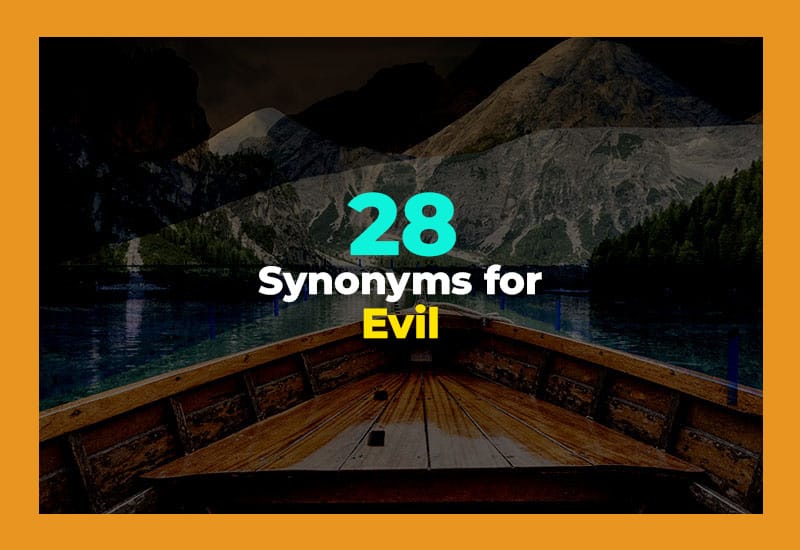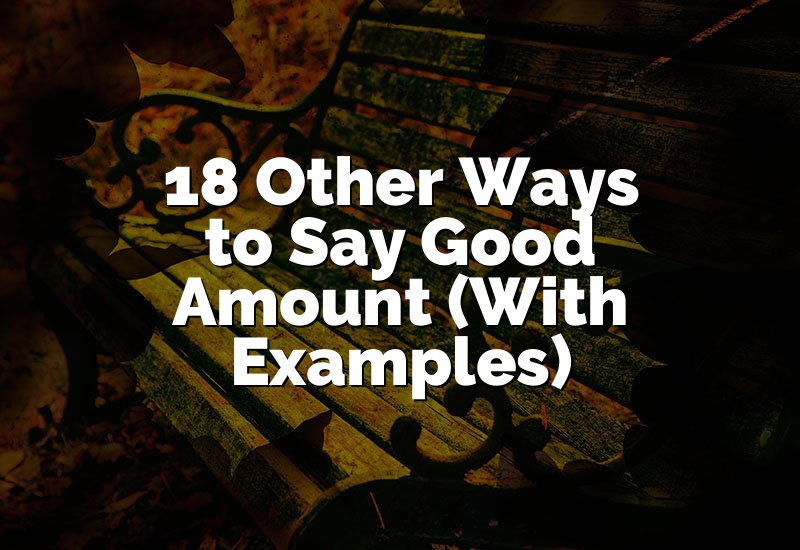You know how sometimes the word “evil” feels a bit too strong or just not quite right? Whether you’re talking about something wicked, cruel, or just plain bad, there are lots of cool words to choose from. From wicked to sinister, these synonyms help you describe different kinds of evil in fresh ways. Let’s dive into 28 words that can make your writing or talking more interesting and clear!
1. Wicked
Wicked means very bad or morally wrong. It often describes people or actions that hurt others on purpose. For example, "The wicked stepmother treated the children unfairly." You might also hear it in a fun way, like "That skateboard trick was wicked!" but mostly it means evil or cruel. Wicked is a classic word used in stories, movies, and everyday talk when you want to show something or someone is truly bad.
2. Sinful
Sinful refers to something against religious or moral rules. It shows that someone did wrong or something bad happened. For example, "Eating too much candy feels sinful, but it tastes so good!" In stories, sinful acts might lead to punishment or regret. It's often used when talking about guilt or bad behavior in a moral or spiritual way. Sinful helps show that something is more than just wrong—it's breaking important rules.
3. Vile
Vile means extremely unpleasant or disgusting. It can describe a person, action, or smell. For example, "He told a vile lie that hurt his friend's feelings." Vile things make people feel sick or shocked. It is a strong word to describe something really nasty or cruel. When you use vile, you want others to know that something is very bad or nasty and should be avoided.
4. Nefarious
Nefarious means very wicked or evil, especially when talking about actions or plans. For example, "The villain's nefarious scheme was stopped just in time." It's a fancy word used mostly in stories or serious talks about crime and bad deeds. Nefarious shows that someone is doing wrong on purpose and often secretly. It sounds serious and important, making it perfect for dramatic or official situations.
5. Corrupt
Corrupt means dishonest or morally bad, especially with power or money. For example, "The corrupt politician took bribes to help his friends." Corruption means someone breaks the rules for personal gain, hurting others. It's often used in politics, business, and law. When you say corrupt, you show someone isn't fair or honest and uses their position in a bad way. It's a very serious kind of evil that affects many people.
6. Malevolent
Malevolent means wishing to do harm or evil to others. For example, "The malevolent witch cast a spell on the village." It shows a strong desire to hurt or cause trouble. Malevolent people or characters are often villains in stories. It's a powerful word to describe someone who isn't just bad but wants to cause pain or problems. Using malevolent helps explain how deeply mean someone can be.
7. Malicious
Malicious means intending to hurt or upset someone on purpose. For example, "She spread malicious rumors about her coworker." It's about actions done with bad intentions. When someone is malicious, they want others to suffer or fail. The word is used in everyday talk and legal situations. Malicious behavior is not an accident but a choice to cause harm. It shows active, mean intentions behind a person's actions.
8. Immoral
Immoral means not following the accepted rules of right and wrong. For example, "Lying to your friends is immoral." It often relates to personal behavior and ethics. Immoral actions go against what people believe is good or proper. The word helps explain that someone's choices break the rules of fairness or kindness. Immoral is a serious word that shows a lack of respect for others or society's standards.
9. Depraved
Depraved means morally bad or corrupt, often in a serious or shocking way. For example, "The depraved criminal showed no remorse." It describes someone or something that is deeply wrong or twisted. Depraved actions are worse than simple mistakes—they show a loss of moral values. The word is often used in crime stories or when talking about very serious wrongdoings.
10. Villainous
Villainous means very bad and acting like a villain in a story. For example, "The villainous thief stole from the poor." It describes someone who does bad things on purpose. Villainous behavior is cruel and unfair. The word is common in movies, books, and everyday speech when talking about people who cause trouble. Using villainous makes the bad person sound like the main enemy or problem.
11. Heinous
Heinous means extremely bad or evil, especially a crime. For example, "The heinous act shocked the entire town." It shows something that is very serious and terrible. Heinous crimes are those that hurt many people or break important laws. The word is often used in news or courtrooms. Heinous tells others that the wrong done is beyond just bad—it is shocking and awful.
12. Atrocious
Atrocious means very bad or cruel. For example, "The atrocious conditions in the prison were inhumane." It can describe actions, behavior, or situations that cause suffering or disgust. Atrocious is a strong word used to show how serious and terrible something is. It helps people understand when something is far worse than just bad or wrong.
13. Cruel
Cruel means causing pain or suffering without caring. For example, "It was cruel to leave the dog outside in the cold." Cruel people or actions hurt others on purpose or don't think about their pain. The word is common in daily talk, stories, and history. Saying something or someone is cruel tells us they are mean and unkind. It's easy to understand and shows real hurt.
14. Brutal
Brutal means very harsh, violent, or cruel. For example, "The brutal fight left both players injured." It describes actions that are strong and often painful. Brutal can talk about physical harm or unfair treatment. The word helps explain when something is not just bad but harsh and forceful. Using brutal shows strong emotions or serious problems in a situation.
15. Monstrous
Monstrous means very cruel or shocking, like a monster. For example, "The monstrous act frightened the whole village." It shows something or someone that is extremely bad or unnatural. Monstrous is often used in stories or when describing terrible behavior. It makes the evil seem bigger and scarier. Using monstrous helps create a strong picture of badness in the reader's mind.
16. Fiendish
Fiendish means very wicked or evil, like a fiend or demon. For example, "He came up with a fiendish plan to trick everyone." It shows clever but cruel ideas or actions. Fiendish is a fun, dramatic word often used in stories or jokes. It describes something bad that is also smart or tricky. Saying something is fiendish gives it a spooky, evil feeling.
17. Sinister
Sinister means giving a feeling that something bad or evil will happen. For example, "The dark clouds looked sinister before the storm." It describes a warning or bad sign. Sinister is often used for places, people, or events that seem threatening. The word makes people feel uneasy or scared. When you say sinister, you mean that danger or evil is near, even if it's not seen yet.
18. Diabolical
Diabolical means extremely evil or wicked, like the devil. For example, "The diabolical villain laughed as he ruined the town." It describes plans or people that are cruel and very bad. Diabolical is a strong, dramatic word used in stories, movies, and serious talks. It shows that someone or something is beyond normal bad—it's dangerously evil.
19. Demonic
Demonic means like a demon or evil spirit. For example, "The demonic possession scared everyone in the house." It describes very bad or evil forces. Demonic is used in stories about ghosts, spirits, or strong evil power. Saying something is demonic makes it sound scary and powerful. It's often used in horror or fantasy to show something very dark.
20. Maleficent
Maleficent means causing harm or evil. For example, "The maleficent sorceress cursed the kingdom." It's often used in stories or fairy tales about bad magic or villains. Maleficent shows evil that is active and powerful. The word sounds magical and serious. Using maleficent helps describe someone who brings trouble or pain with a strong, dark force.
21. Hateful
Hateful means full of hate or very unpleasant. For example, "He gave her a hateful look after the argument." It describes feelings or actions that show strong dislike or cruelty. Hateful people or words can hurt others deeply. The word is common and easy to understand. Using hateful shows the bad emotions behind someone's actions or words.
22. Abominable
Abominable means very bad or disgusting. For example, "The abominable smell made everyone leave the room." It describes things that people strongly dislike or find horrible. Abominable is often used for behavior, actions, or things that shock or upset. The word helps show how serious and strong the bad feeling is. It's a powerful way to say something is truly awful.
23. Despicable
Despicable means very bad and deserving strong dislike or hatred. For example, "Stealing from children is despicable." It describes actions or people who are mean and unfair. Despicable is a clear word used to show strong disapproval. When you say someone is despicable, you mean they have done something truly wrong and hurtful. It's a serious word to show moral badness.
24. Repugnant
Repugnant means very offensive or disgusting. For example, "His rude behavior was repugnant to everyone." It describes things that people cannot accept or like. Repugnant is used for ideas, actions, or feelings that cause strong dislike. The word is formal and strong. Using repugnant tells others that something is not just bad, but deeply unpleasant and hard to tolerate.
25. Offensive
Offensive means causing hurt or upset feelings. For example, "That joke was offensive to many people." It describes words or actions that others find rude or hurtful. Offensive is a common word used in daily talk and rules about behavior. When you say something is offensive, you mean it is not kind or polite. It helps explain why some things should be avoided to keep peace and respect.
26. Dark
Dark means not just about color but also about bad or evil feelings. For example, "He had a dark past full of secrets." It describes moods, thoughts, or stories that are scary or sad. Dark shows sadness, danger, or evil in a quiet way. It's often used in literature and movies. Using dark helps create a serious or spooky feeling about people or events.
27. Baleful
Baleful means threatening harm or evil. For example, "The baleful look in his eyes warned everyone to stay away." It shows danger or bad intentions. Baleful is an old word but still used in stories and serious talks. It describes someone or something that brings trouble or pain. Using baleful helps make the threat feel real and serious.

Final Thoughts
Choosing the right word to describe evil can change how your story or conversation feels. Words like wicked, malicious, or sinister add flavor and depth to your message. Remember, some words fit better in stories, while others work great in everyday talk. Using these synonyms helps you be clear and creative when talking about bad or harmful things. Try using them and see how your writing shines!









